#Bible Translation Process
Text
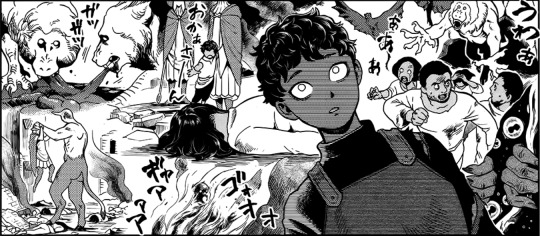
Honestly I don't think I'm qualified to make this post, I just don't know if I can make coherent enough words man. But the thoughts are in there and I will try to articulate them. This is probably going to be mostly images though.
anyway yeah KABRU POST.
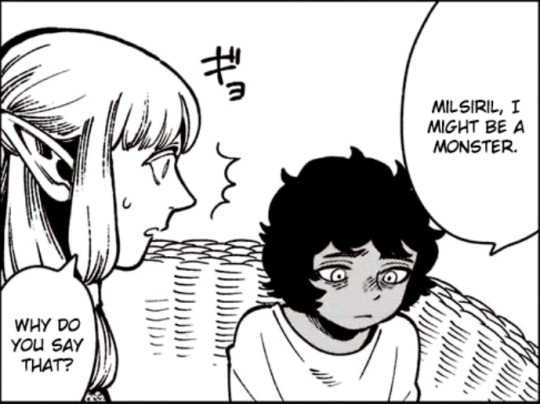

A couple nights ago (at approximately 2:30am, lasting a little over half an hour) I had a bit of a moment about Kabru. That, too, was mostly images- most of what you see in this more concise post were presented then as well. I think my main points of the "moment" were about Kabru's trauma + self hatred, his autism and/or general otherness, and also a little labru if you'd like..
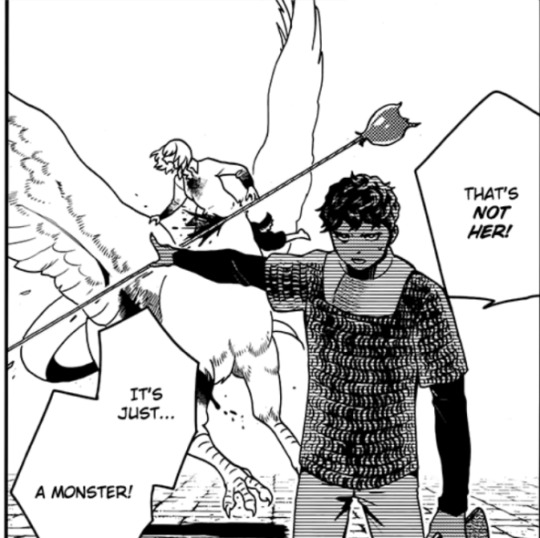
I think something easy to start with is I wanna point out Kabru's constant back and forth and conflicting opinions of demihumans and how, I believe, thats a reflection of how he goes back and forth on what he believes his purpose of living is- and the general worth of his own life. I've said it before and i've just kinda shown it in images; Kabru is "i think im a monster and it disgusts me" where Laios is "I know im a human and it disgusts me" (i could go more into the latter on another post)
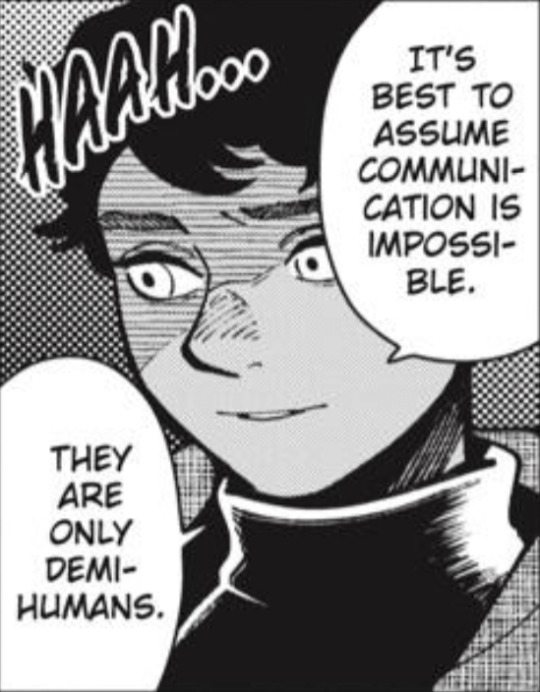
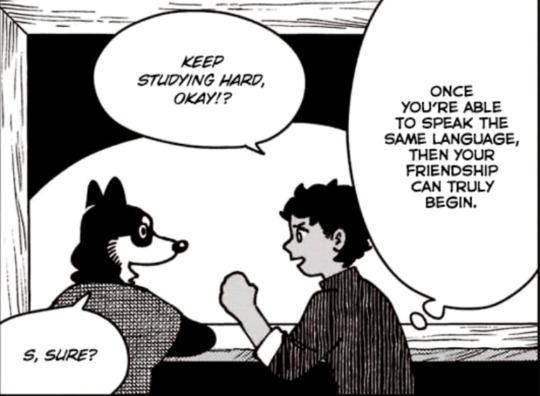
the above are both from the world bible, with the left being from the section on kobolds and the right being from the section on Kuro specifically.
Utaya was very near to the desert where most of the kobold population is, this is likely why Kabru is able to speak Kuro's language- he grew up around demihumans. (chapter 48 cover, kobold chapter in the world bible) I won't try to speak for how his mother or the rest of utaya felt about the kobolds but I can say that Kabru was very much othered as a child, as was his mother, purely for the way her son's (kabru) eyes looked.

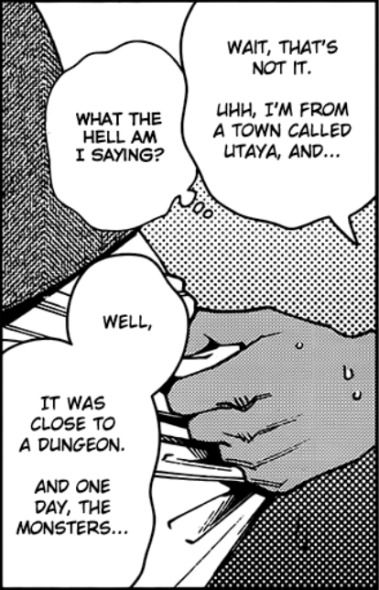
I feel like its fair enough to say that both kabru and the kobolds were othered, and possibly for similar reasons (villager's seeing them as nonhuman, as monsters) and the fact that Kabru learned their language probably didn't help his case. I think his perception of kobolds (and all demihumans, subsequently himself, as he probably still views himself as nonhuman or not human enough.. deep down) was damaged by the Utaya incident.
at 2:30am when I first started this ramble my main comment was that "had the utaya incident not happened kabru would have little reason to feel ashamed for his connection to monsters. and may have ended up similar to laios in that he couldve had otherkin swag" which is just a sort of silly way of saying Kabru could've learned to love the thought that he is possibly nonhuman or at least not hated himself so much for it.

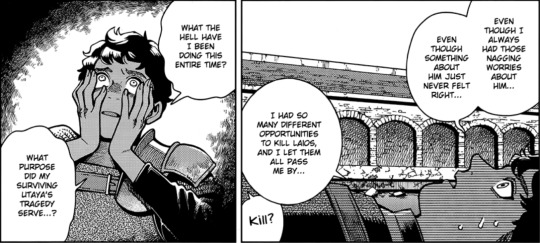
in the original ramble I said, and quote, "he has been STALKING laios. laios is his hyperfixation to learn how he can ever be loved. he keeps going back and forth so harshly on wether or not he wants to kill Laios and he clearly sees his survival from utaya not as an unfortunate trauma [*] but as a necessary, deserved fate. a punishment for his mother's witchy sins, and for his sin of being non-human. to atone for it all, to apologize for being alive, he tries to better the lives of all humanity. He was set on his way to dethrone the governor of the island . do you understand? im going insane"
*i also said somethings about the way he processes other people's traumas and not his own. He's able to understand and even help some people, but he struggles to process his own issues and see himself as worthy of love and life.


^some examples of Kabru being understanding of or helping others who have suffered greatly.
I think its also worth mentioning that with Rin (called "Lynn" in that translation) he says "I wish there was a way to get her out of this" though he's insisted and pushed for himself to go into a dungeon;
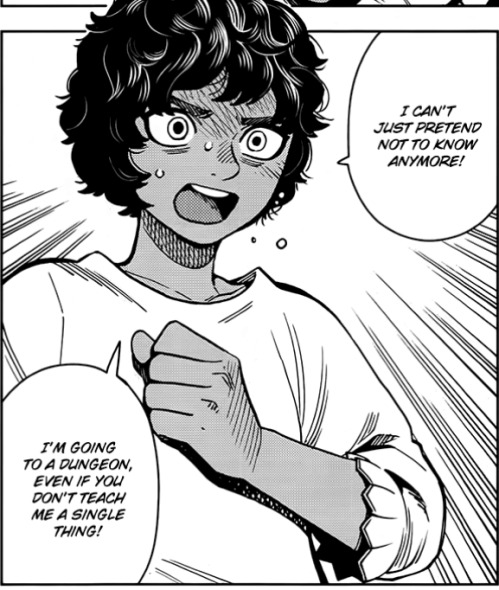
In chapter 94, Mithrun says "The desire I had left wasn't revenge. All I wanted.. was for it to finish devouring me." and I don't feel like it's a stretch to say Kabru was in a similar situation. Mithrun sought out the demon with no plan on how to kill something like that because deep down he wanted it to end his (Mithrun's) own life, to finish the trauma it caused and kill him. I think Kabru went into the dungeon in part with the hopes that it'd kill him. That the same thing that destroyed Utaya and caused him so much trauma would just.. finish him.
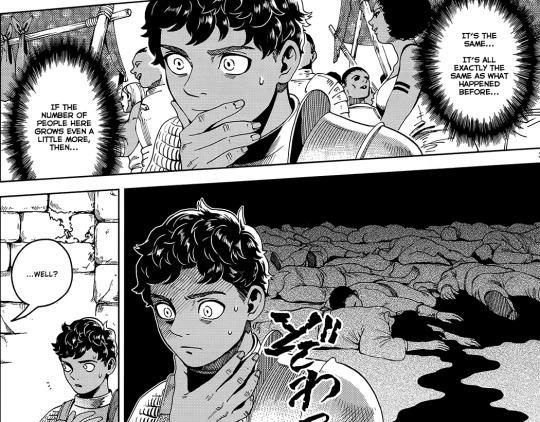
I just think Kabru is a beautifully complex character, I have a lotta thoughts on him and I don't see nearly as many analysis posts for him than I do Laios (despite labru being such a popular ship)
there is no tldr for this post idk how to summarize it. do what you will with this collection of images. have fun. go crazy
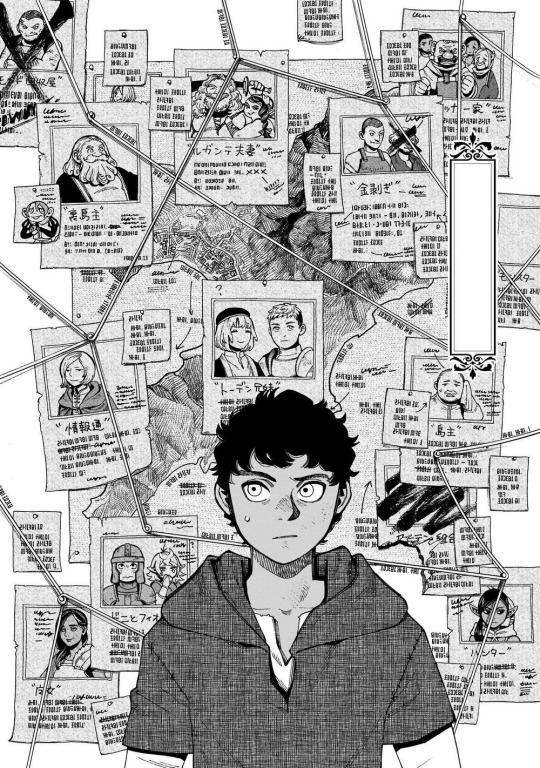
fun fact the woman in the bottom left corner is his mother, she is labeled here as "witch"
#dungeon meshi#delicious in dungeon#dunmeshi#kabru#kabru dungeon meshi#kabios#labru#yeah its a long post i dont care. read it#also i only mentioned it briefly but i do think kabru is autistic .#yk that post thats like 'no im not autistic i know all the social cues etc etc etc. hey wait a minute' yeah. that#ok whatever. starts making another laios post
4K notes
·
View notes
Text
“Humans in the loop” must detect the hardest-to-spot errors, at superhuman speed
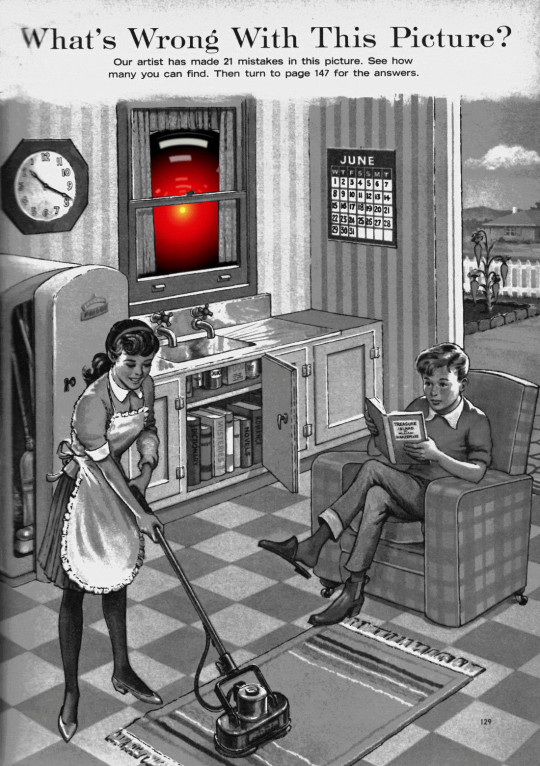
I'm touring my new, nationally bestselling novel The Bezzle! Catch me SATURDAY (Apr 27) in MARIN COUNTY, then Winnipeg (May 2), Calgary (May 3), Vancouver (May 4), and beyond!

If AI has a future (a big if), it will have to be economically viable. An industry can't spend 1,700% more on Nvidia chips than it earns indefinitely – not even with Nvidia being a principle investor in its largest customers:
https://news.ycombinator.com/item?id=39883571
A company that pays 0.36-1 cents/query for electricity and (scarce, fresh) water can't indefinitely give those queries away by the millions to people who are expected to revise those queries dozens of times before eliciting the perfect botshit rendition of "instructions for removing a grilled cheese sandwich from a VCR in the style of the King James Bible":
https://www.semianalysis.com/p/the-inference-cost-of-search-disruption
Eventually, the industry will have to uncover some mix of applications that will cover its operating costs, if only to keep the lights on in the face of investor disillusionment (this isn't optional – investor disillusionment is an inevitable part of every bubble).
Now, there are lots of low-stakes applications for AI that can run just fine on the current AI technology, despite its many – and seemingly inescapable - errors ("hallucinations"). People who use AI to generate illustrations of their D&D characters engaged in epic adventures from their previous gaming session don't care about the odd extra finger. If the chatbot powering a tourist's automatic text-to-translation-to-speech phone tool gets a few words wrong, it's still much better than the alternative of speaking slowly and loudly in your own language while making emphatic hand-gestures.
There are lots of these applications, and many of the people who benefit from them would doubtless pay something for them. The problem – from an AI company's perspective – is that these aren't just low-stakes, they're also low-value. Their users would pay something for them, but not very much.
For AI to keep its servers on through the coming trough of disillusionment, it will have to locate high-value applications, too. Economically speaking, the function of low-value applications is to soak up excess capacity and produce value at the margins after the high-value applications pay the bills. Low-value applications are a side-dish, like the coach seats on an airplane whose total operating expenses are paid by the business class passengers up front. Without the principle income from high-value applications, the servers shut down, and the low-value applications disappear:
https://locusmag.com/2023/12/commentary-cory-doctorow-what-kind-of-bubble-is-ai/
Now, there are lots of high-value applications the AI industry has identified for its products. Broadly speaking, these high-value applications share the same problem: they are all high-stakes, which means they are very sensitive to errors. Mistakes made by apps that produce code, drive cars, or identify cancerous masses on chest X-rays are extremely consequential.
Some businesses may be insensitive to those consequences. Air Canada replaced its human customer service staff with chatbots that just lied to passengers, stealing hundreds of dollars from them in the process. But the process for getting your money back after you are defrauded by Air Canada's chatbot is so onerous that only one passenger has bothered to go through it, spending ten weeks exhausting all of Air Canada's internal review mechanisms before fighting his case for weeks more at the regulator:
https://bc.ctvnews.ca/air-canada-s-chatbot-gave-a-b-c-man-the-wrong-information-now-the-airline-has-to-pay-for-the-mistake-1.6769454
There's never just one ant. If this guy was defrauded by an AC chatbot, so were hundreds or thousands of other fliers. Air Canada doesn't have to pay them back. Air Canada is tacitly asserting that, as the country's flagship carrier and near-monopolist, it is too big to fail and too big to jail, which means it's too big to care.
Air Canada shows that for some business customers, AI doesn't need to be able to do a worker's job in order to be a smart purchase: a chatbot can replace a worker, fail to their worker's job, and still save the company money on balance.
I can't predict whether the world's sociopathic monopolists are numerous and powerful enough to keep the lights on for AI companies through leases for automation systems that let them commit consequence-free free fraud by replacing workers with chatbots that serve as moral crumple-zones for furious customers:
https://www.sciencedirect.com/science/article/abs/pii/S0747563219304029
But even stipulating that this is sufficient, it's intrinsically unstable. Anything that can't go on forever eventually stops, and the mass replacement of humans with high-speed fraud software seems likely to stoke the already blazing furnace of modern antitrust:
https://www.eff.org/de/deeplinks/2021/08/party-its-1979-og-antitrust-back-baby
Of course, the AI companies have their own answer to this conundrum. A high-stakes/high-value customer can still fire workers and replace them with AI – they just need to hire fewer, cheaper workers to supervise the AI and monitor it for "hallucinations." This is called the "human in the loop" solution.
The human in the loop story has some glaring holes. From a worker's perspective, serving as the human in the loop in a scheme that cuts wage bills through AI is a nightmare – the worst possible kind of automation.
Let's pause for a little detour through automation theory here. Automation can augment a worker. We can call this a "centaur" – the worker offloads a repetitive task, or one that requires a high degree of vigilance, or (worst of all) both. They're a human head on a robot body (hence "centaur"). Think of the sensor/vision system in your car that beeps if you activate your turn-signal while a car is in your blind spot. You're in charge, but you're getting a second opinion from the robot.
Likewise, consider an AI tool that double-checks a radiologist's diagnosis of your chest X-ray and suggests a second look when its assessment doesn't match the radiologist's. Again, the human is in charge, but the robot is serving as a backstop and helpmeet, using its inexhaustible robotic vigilance to augment human skill.
That's centaurs. They're the good automation. Then there's the bad automation: the reverse-centaur, when the human is used to augment the robot.
Amazon warehouse pickers stand in one place while robotic shelving units trundle up to them at speed; then, the haptic bracelets shackled around their wrists buzz at them, directing them pick up specific items and move them to a basket, while a third automation system penalizes them for taking toilet breaks or even just walking around and shaking out their limbs to avoid a repetitive strain injury. This is a robotic head using a human body – and destroying it in the process.
An AI-assisted radiologist processes fewer chest X-rays every day, costing their employer more, on top of the cost of the AI. That's not what AI companies are selling. They're offering hospitals the power to create reverse centaurs: radiologist-assisted AIs. That's what "human in the loop" means.
This is a problem for workers, but it's also a problem for their bosses (assuming those bosses actually care about correcting AI hallucinations, rather than providing a figleaf that lets them commit fraud or kill people and shift the blame to an unpunishable AI).
Humans are good at a lot of things, but they're not good at eternal, perfect vigilance. Writing code is hard, but performing code-review (where you check someone else's code for errors) is much harder – and it gets even harder if the code you're reviewing is usually fine, because this requires that you maintain your vigilance for something that only occurs at rare and unpredictable intervals:
https://twitter.com/qntm/status/1773779967521780169
But for a coding shop to make the cost of an AI pencil out, the human in the loop needs to be able to process a lot of AI-generated code. Replacing a human with an AI doesn't produce any savings if you need to hire two more humans to take turns doing close reads of the AI's code.
This is the fatal flaw in robo-taxi schemes. The "human in the loop" who is supposed to keep the murderbot from smashing into other cars, steering into oncoming traffic, or running down pedestrians isn't a driver, they're a driving instructor. This is a much harder job than being a driver, even when the student driver you're monitoring is a human, making human mistakes at human speed. It's even harder when the student driver is a robot, making errors at computer speed:
https://pluralistic.net/2024/04/01/human-in-the-loop/#monkey-in-the-middle
This is why the doomed robo-taxi company Cruise had to deploy 1.5 skilled, high-paid human monitors to oversee each of its murderbots, while traditional taxis operate at a fraction of the cost with a single, precaratized, low-paid human driver:
https://pluralistic.net/2024/01/11/robots-stole-my-jerb/#computer-says-no
The vigilance problem is pretty fatal for the human-in-the-loop gambit, but there's another problem that is, if anything, even more fatal: the kinds of errors that AIs make.
Foundationally, AI is applied statistics. An AI company trains its AI by feeding it a lot of data about the real world. The program processes this data, looking for statistical correlations in that data, and makes a model of the world based on those correlations. A chatbot is a next-word-guessing program, and an AI "art" generator is a next-pixel-guessing program. They're drawing on billions of documents to find the most statistically likely way of finishing a sentence or a line of pixels in a bitmap:
https://dl.acm.org/doi/10.1145/3442188.3445922
This means that AI doesn't just make errors – it makes subtle errors, the kinds of errors that are the hardest for a human in the loop to spot, because they are the most statistically probable ways of being wrong. Sure, we notice the gross errors in AI output, like confidently claiming that a living human is dead:
https://www.tomsguide.com/opinion/according-to-chatgpt-im-dead
But the most common errors that AIs make are the ones we don't notice, because they're perfectly camouflaged as the truth. Think of the recurring AI programming error that inserts a call to a nonexistent library called "huggingface-cli," which is what the library would be called if developers reliably followed naming conventions. But due to a human inconsistency, the real library has a slightly different name. The fact that AIs repeatedly inserted references to the nonexistent library opened up a vulnerability – a security researcher created a (inert) malicious library with that name and tricked numerous companies into compiling it into their code because their human reviewers missed the chatbot's (statistically indistinguishable from the the truth) lie:
https://www.theregister.com/2024/03/28/ai_bots_hallucinate_software_packages/
For a driving instructor or a code reviewer overseeing a human subject, the majority of errors are comparatively easy to spot, because they're the kinds of errors that lead to inconsistent library naming – places where a human behaved erratically or irregularly. But when reality is irregular or erratic, the AI will make errors by presuming that things are statistically normal.
These are the hardest kinds of errors to spot. They couldn't be harder for a human to detect if they were specifically designed to go undetected. The human in the loop isn't just being asked to spot mistakes – they're being actively deceived. The AI isn't merely wrong, it's constructing a subtle "what's wrong with this picture"-style puzzle. Not just one such puzzle, either: millions of them, at speed, which must be solved by the human in the loop, who must remain perfectly vigilant for things that are, by definition, almost totally unnoticeable.
This is a special new torment for reverse centaurs – and a significant problem for AI companies hoping to accumulate and keep enough high-value, high-stakes customers on their books to weather the coming trough of disillusionment.
This is pretty grim, but it gets grimmer. AI companies have argued that they have a third line of business, a way to make money for their customers beyond automation's gifts to their payrolls: they claim that they can perform difficult scientific tasks at superhuman speed, producing billion-dollar insights (new materials, new drugs, new proteins) at unimaginable speed.
However, these claims – credulously amplified by the non-technical press – keep on shattering when they are tested by experts who understand the esoteric domains in which AI is said to have an unbeatable advantage. For example, Google claimed that its Deepmind AI had discovered "millions of new materials," "equivalent to nearly 800 years’ worth of knowledge," constituting "an order-of-magnitude expansion in stable materials known to humanity":
https://deepmind.google/discover/blog/millions-of-new-materials-discovered-with-deep-learning/
It was a hoax. When independent material scientists reviewed representative samples of these "new materials," they concluded that "no new materials have been discovered" and that not one of these materials was "credible, useful and novel":
https://www.404media.co/google-says-it-discovered-millions-of-new-materials-with-ai-human-researchers/
As Brian Merchant writes, AI claims are eerily similar to "smoke and mirrors" – the dazzling reality-distortion field thrown up by 17th century magic lantern technology, which millions of people ascribed wild capabilities to, thanks to the outlandish claims of the technology's promoters:
https://www.bloodinthemachine.com/p/ai-really-is-smoke-and-mirrors
The fact that we have a four-hundred-year-old name for this phenomenon, and yet we're still falling prey to it is frankly a little depressing. And, unlucky for us, it turns out that AI therapybots can't help us with this – rather, they're apt to literally convince us to kill ourselves:
https://www.vice.com/en/article/pkadgm/man-dies-by-suicide-after-talking-with-ai-chatbot-widow-says

If you'd like an essay-formatted version of this post to read or share, here's a link to it on pluralistic.net, my surveillance-free, ad-free, tracker-free blog:
https://pluralistic.net/2024/04/23/maximal-plausibility/#reverse-centaurs

Image:
Cryteria (modified)
https://commons.wikimedia.org/wiki/File:HAL9000.svg
CC BY 3.0
https://creativecommons.org/licenses/by/3.0/deed.en
#pluralistic#ai#automation#humans in the loop#centaurs#reverse centaurs#labor#ai safety#sanity checks#spot the mistake#code review#driving instructor
852 notes
·
View notes
Text


for those of you that were interested in the contents of the DVD mentioned in a previous post ↑
youtube
i was able to record and upload it with a few workarounds to avoid copyright, so you can now watch it in its entirety!
you'll find details of behind the scenes photoshoots of "gothic & lolita bible" and "kera" magazine, the process of designing lolita and ouji clothes with "baby the stars shine bright" designers Masumi Kano, Kumiko Uehara, and "alice & the pirates" designer Mitsuba. interviews with models Misako Aoki, Midori Fukasawa, and Akira Shiraishi. lolita and "doll" makeup tutorials by Akio Namiki.
english subs are available, but they are provided by a mixture of myself, my partner, and a few gaps filled by machine translation—i definitely tried, but i can't guarantee 100% accuracy.. corrections are very welcomed!
#baby the stars shine bright gothic & lolita bible dvd (2010)#btssb#AATP#baby the stars shine bright#alice and the pirates#lolita fashion#egl#egl fashion#ouji#ouji fashion#egl community#gothic and lolita bible#gothic lolita bible#kera#kera magazine#harajuku#harajuku fashion#masumi kano#kumiko uehara#misako aoki#midori fukasawa#akira shiraishi#mitsuba#akio namiki#2010#jfashion
714 notes
·
View notes
Note
Excuse me kind creature, I'm thoroughly behind on like everything and I wanted to ask, what's the deal with kusuriuri? Like, I assume, judging by things I see once in a while that they seem to be separate lads, but like... Where is it known for? What's going on? I'm a bit confused @__@;;;;;
No worries! This information was dropped on us without warning a little while ago. It came via a YouTube video released by the movie staff. Director Nakamura revealed that the two Medicine Sellers are different and carry different swords, and he released some backstory about the swords and the Medicine Sellers.
You can watch the YouTube video with auto-generated subtitles, but the quality of the translation is pretty bad. Fortunately, @kastellaran did some awesome translation work on the story bible page they showed in the video, which explains more of what they were talking about.
Just a warning: I don't think this backstory is what any of us expected, and the ideas behind it can get a little complicated. We've been doing a lot of processing since we learned all this!
Basically, the swords and Medicine Sellers are all different agents of a single cosmic force. They appear in the world as needed, up to a maximum of 64 at a time. These ideas are based on the Trigram and hexagram concepts from the I Ching, a Taoist philosophical text. @purplealmonds explained more about those concepts in a video here.
Director Nakamura also said a little bit about the two Medicine Sellers' personalities in an interview on Twitter. You can read an auto-translation of that section in the second half of this post.
There's been a lot of discussion since this info came out, but this is probably more than enough to process for now! If you'd like, come join us in the Mononoke community, where we've been posting all kinds of theories and speculation about the new lore and the movie.
115 notes
·
View notes
Text
Idioms in Catalan with a religious origin
There's quite a lot of idioms that we say in everyday life, outside of the context of religion, but that come from religious stories or events.
Most of them come from Christianity, and many of them are shared with other Romance languages or other languages from historically Christian countries. To keep this list accessible to everyone regardless of cultural background, I will include the literal translation to English and also an explanation all of them.
Let's see how many of these you can understand before seeing the explanation. Let us know in the tags!
1. Fer Pasqua abans de Rams = "to do Easter before Palm Sunday", meaning to get pregnant, have a baby, or to have sex before getting married. Nowadays it's used in a more general sense to mean to do something before it's time (like English "put the cart before the horse"). Palm Sunday is a holiday celebrated the week before Easter.
2. Per a més inri = "for more INRI", used to add a bad thing on top of something else, making a situation even worse or more humiliating. It's a reference to the sign that said "INRI" (stands for the initials of "Jesus of Nazareth King of the Jews" in Latin) that Roman soldiers hanged on Christ's crucifix to make fun of him.
3. A la babalà = "in the babalà way", meaning to do something without having thought much about it. But what does "babalà" mean? This word doesn't exist in the Catalan language outside of this expression. It comes from the Arabic Alà bâb Allâh which means "in God's hands".
4. On Crist va perdre l'espardenya = "where Christ lost his sandal", or on Crist va perdre el barret = "where Christ lost his hat", meaning somewhere very far away and usually in the middle of nothing. I don't know of any story that has Christ lose his sandal or hat.
5. Perdut de la mà de Déu = "lost by God's hand", meaning a place in the middle of nowhere.
6. Ser un calvari ="to be a calvary", meaning that something is a cause of suffering. You can also hear quin calvari! = "what a calvary!". This is a reference to Mount Calvary, where Christ was crucified.
7. Endavant les atxes = "ahead with the candles!", meaning "keep going!", used to encourage to keep going in a negative situation with difficulties or a situation that you would have preferred to avoid. An atxa is a kind of big candle that the first people in a religious procession carry. This was the shout that would start a procession.
(Note: in recent years, Spanish media has used this idiom as supposed proof that Catalan independentists who said it are calling for violence, using a fake translation that assumed that "atxa" must mean the same as Spanish "hacha", meaning "axe" 🪓, because the pronunciation is almost identical. This is false, when people were saying "endavant les atxes" they did not intend any meaning related to "bring the axes". This was used to justify violence against Catalan activists, but has no ground in reality. "Axe"🪓 in Catalan would be "destral".)
8. Net com una patena = "as clean as a paten", meaning very clean. A paten is a kind of small dish used in Catholic mass, where the blessed sacramental bread in placed on.
9. Acabar com el rosari de l'aurora = "to end up like the dawn rosary", meaning to end very, very badly, usually in violence. The dawn rosary used to be a procession that was done in the early morning of certain holidays while praying the rosary. The idiom (which also exists in Spanish) comes from the year 1868. Around those years, there were many anticlerical riots, while the Catholic church kept doing the dawn rosary on the streets and often assigning it political meaning. In Barcelona and other cities, anticlerical protestors tried to stop the dawn rosary from happening, and it ended in violence and blood.
10. Plorar com una Magdalena = "to cry like a Magdalene", meaning to cry a lot and very desperately. This is a reference to Mary Magdalene, a character from the Bible's New Testament who cried when she met Christ.
11. Déu-n'hi-do! = "God gives!". This expression is difficult to translate because I don't think English has an equivalent (the closest I can think of are "wow!" or even "holy shit!"), but Catalan people use it a lot. It's an exclamation used to show surprise, awe or to mean a big quantity.
12. Ser més vell que Matusalem = "to be older than Methuselah", meaning that someone is very very old. Methuselah is a character from the Bible's Old Testament who is said to have lived for 969 years. This comparison is used for comedic value.
13. Rentar-se'n les mans = "to wash one's hands", meaning to say you're not responsible for what happens. This is a quote from the Bible's New Testament: when Christ is being judged by Pontius Pilate, the crowd is asking him to sentence him to crucifixion. He asks Christ to defend himself, but he doesn't. Pilate doesn't want to sentence him to death, but he sees he has no other option. Then, he sees his hands are stained with Christ's blood, and washes his hands as he decides that this situation will not be his responsibility.
14. Arribar a misses dites = "to arrive to mass [already] said", meaning to arrive late when something has already happened.
15. Ser com les palmes d’Elx, que vingueren el matí de Pasqua = "to be like the Elx palms, that arrived on Easter morning", this is used in the Valencian Country to mean to be late. Elx is a city with the biggest palm groove in Europe ever since the Middle Ages, and many of these palm tree leafs are used for making the palms used for Palm Sunday, the celebration that happens a week before Easter.
16. Va a missa = "goes to mass", meaning whatever is said is exactly what will happen, without complaining or second thoughts.
17. Endiumenjar-se = "to Sunday yourself" or "to Sunday up", meaning to dress up in your best clothes (same as "to wear your Sunday best" in English). Traditionally, people used to wear their best clothes for Sunday mass.
18. Alt com un sant Pau = "as tall as a saint Paul", someone who is very tall. Saint Paul was not tall, in his texts he describes himself as a "little man". The origin of this sentence is in Catalonia centuries ago. People used to celebrate the holiday of Saint Paul's Conversion (January 25th). In the Sant Pau del Camp church area in Barcelona, the tradition for this day had a man yield a huge sword. For this reason, the man had to be tall and strong.
19. Alegre/content com unes pasqües = "as cheerful/happy as Easters", meaning to be very happy and cheerful.
20. Discutir sobre el sexe dels àngels or parlar del sexe dels àngels = "to argue about angels' sex", meaning to endlessly argue heatedly about something insignificant where neither side will ever convince the other to change their minds. Also called una discussió bizantina="a Byzantine argument". This comes from the historical fact that Biblical scholars spent centuries arguing on whether angels can be male or female or not. Legends say that, when the Ottomans were laying siege on Constantinople in 1453 and getting ready to invade it, the Byzantine theologists were arguing about whether angels have sexes instead of doing anything useful.
21. Pagant, sant Pere canta = "if you pay, saint Peter sings". The person who hears it, might answer i sant Joan fa esclops = "and Saint John makes clogs". This means that money will get you anything, even the things that seemed impossible. It might be a reference to the Bible story where saint Peter was asked if he knew Christ after he was taken to crucify, and Peter lied three times and said he didn't know him. "To sing" in Catalan can also mean "to confess". Maybe, if they had paid him he would have confessed.
22. Perdre l'oremus = "to lose the oremus", meaning to lose control of yourself, or to get disoriented or lose memory. "Oremus" (which means "let's pray" in Latin) is the sentence that Catholic priests say during mass to lead a prayer. It's believed that this idiom comes from some incidents where a priest would start the sentence "oremus..." but then couldn't find the prayer he wanted to lead, which he might have misplaced somewhere else in his book. So he would say "oremus... uh... oremus..." while flipping the pages looking for the right one.
23. A bon sant t'encomanes! = "You entrust yourself to a good saint!", said with irony. It's said when you ask for help or rely on someone who is not competent.
24. Ser més papista que el Papa = "To be more Popeist than the Pope", meaning someone who is too dogmatic, too strict or extremist in following the rules, or who believes in or defends something in a more extreme way than the people most affected by it.
25. Qui no coneix Déu, a qualsevol sant li resa = "He who doesn't know God, prays to any saint", used to compare something very good to something worse that someone else likes, usually something worse but that is very popular.
And there's probably others that I forgot.
How many of these are shared with your language?
#llengua catalana#religió#languages#català#catalan#coses de la terra#religions#catholicism#language learning#langblr#polyglot#language#romance languages#cultures#culture
145 notes
·
View notes
Note
Hey sorry idk if you'd know this but I quite literally don't know where to turn about this so I'm sending this ask to every queer+catholic blog I can find
Are there *any* resources out there for queer/trans Catholics that go beyond affirmation and show how to pursue a religious life that goes beyond the laity (e.g. priesthood, joining a convent/monastery, something similar) without having to brush your queerness aside. I feel like if I don't find something soon I might go insane
years ago, i attended a Zoom event with Fr. James Alison as a keynote speaker, and something he said has been glued to my brain ever since. he said it in Spanish, so i'll try to remember, paraphrase and translate: "while they try to get us to stop being queer, what we must try to do is to be better queers."
i love what you said about "beyond affirmation" and that is precisely why i got reminded of the quote and WHY this quote resonated with me to begin with.
imho, there is a fundamental issue with a lot of queer theology and it's that it doesn't go beyond apologetics. it's not pragmatic nor does it seem to engage critically with the material conditions that work with or against queerness. and it's truly such a shame, because living "religiously" to me, as a queer catholic, it's infinitely more a matter of coherence, love, devotion and solidarity, than learning how to "reconcile" gayness/transness with the Bible.
it's a journey, of course. the apologetics were and are necessary for many of us to unlearn the hatred that might've been instilled in us through religious education and upbringing. however, here are some resources that, in my opinion, show how to pursue queer-religious-life.
💌 catholic/christian resources:
[book] The Reckless Way of Love: Notes on Following Jesus by Dorothy Day. Unlike larger collections and biographies, which cover her radical views, exceptional deeds, and amazing life story, this book focuses on a more personal dimension of her life: Where did she receive strength to stay true to her God-given calling despite her own doubts and inadequacies and the demands of an activist life? What was the unquenchable wellspring of her deep faith and her love for humanity?
[book & account] Black Liturgies: Prayers, Poems, and Meditations for Staying Human by Cole Arthur Riley. Black Liturgies is a digital project that connects spiritual practice with Black emotion, Black memory, and the Black body. In this book, she brings together hundreds of new prayers, along with letters, poems, meditation questions, breath practices, scriptures, and the writings of Black literary ancestors to offer forty-three liturgies that can be practiced individually or as a community.
[book] Cry of the Earth, Cry of the Poor by Leonardo Boff. Focusing on the threated Amazon of his native Brazil, Boff traces the economic and metaphysical ties that bind the fate of the rain forests with the fate of the indigenous peoples and the poor of the land. He shows how liberation theology must join with ecology in reclaiming the dignity of the earth and our sense of a common community, part of God's creation. To illustrate the possibilities, Boff turns to resources in Christian spirituality both ancient and modern, from the vision of St. Francis of Assisi to cosmic christology.
[book] Undoing Theology: Life Stories from Non-normative Christians by Chris Greenough. The fundamental issue with ‘queer’ research is it cannot exist in any definable form, as the purpose of queer is to disrupt and disturb. Undoing Doing generates a process of ‘undoing’ as central to queer research enquiries. Aiming to engage in a process which breaks free from traditional academic norms, the text explores three life stories
[podcast] The Magnificast. "A weekly podcast about Christianity and leftist politics. The Magnificast is hosted by Dean Dettloff and Matt Bernico. Each week's episode focuses on a unique or under-realized aspect of territory between Christianity and politics that no one taught you about in sunday school."
💌 non-christian but still excellent resources:
[book] Hijab Butch Blues by Lamya H. A memoir by a butch hijabi that follows the experiences of the author through stories and figures from the Qur'an.
[book] Lean on Me: A Politics of Radical Care by Lynne Segal. Questions of care, intimacy, education, meaningful work, and social engagement lie at the core of our ability to understand the world and its possibilities for human flourishing. In Lean On Me feminist thinker Lynne Segal goes in search of hope in her own life and in the world around her. She finds it entwined in our intimate commitments to each other and our shared collective endeavours.
i don't think these are precisely what you were looking for. but i hope these resources bring you as much peace and hope as they have brought me.
70 notes
·
View notes
Note
Different person, but the anon Lilith it's right: Lilith was a monster.
And in the different versions of all this, there is one where they are not... dense, that they could also have followed.
When Cain and Abel happened, Adam and Eve were separated for 120 years. During those 120 years, consensually, Adam and Lilith were together.
The problem, in general, of Vivzie is that she does not specify what part of Christianity she wants to criticize (for obvious reasons, for lack of balls even, she will not tell Judaism nor Islam a single criticism, that is why we cannot even say that she criticizes the Abrhamic religions) and not knowing what she is criticizing, what is left is nothing.
For example, if she really wants to criticize Christianity, Lilith would not exist. Because she is not in the canon, she is Mesopotamian.
She only becomes "Adam's wife" when a satirical book is written in medieval times. And, in Zoharism, it is when Naamah, Adam's third wife, appears.
And in the Kabbalah, the fourth and fifth wives of Adam appear: Agrat bat Mahlat and Eisheth Zenunim.
Something that people always repeat, is not to look further, and this is a problem already in general with some texts or generational.
For example, one of my college papers was about how the new versions of Medusa were only based on a specific event of something that is not even canonical.
The original Medusa, she appears in Hesiod's Theogony, and there we are only told whose daughter and sister she was, that she slept with Poseidon and that Perseus cut off her head. It never even goes into who Perseus is.
Then comes Pseudo-Apolodorus, he writes that Medusa was the only human, he puts lore to Perseus, but, the change he makes is that after Poseidon lost against Athena for Athens, he goes and seduces Medusa, and she accepts. That is why Athena punishes her.
However, the most popular version is Ovid's version, the rape. It's funny that it's the most popular one, since Ovid wrote The Metamorphoses while in exile and wanting to throw shit at the Roman gods. The guy succeeded.
The new versions even punish not Poseidon, but Perseus, since they ignored the fact that Perseus is also coerced to cut off his head. Technically they are two victims facing each other. The new versions want to put Athena as someone who "protects" Medusa and that Perseus is the bad guy.
And so the thing is deformed: another example is the Odyssey.
Odysseus' journey is only divided into 2 books: The Odyssey and the Telemachia. People were making their fanfic around those two books.
From there there is supposed to be a third book, of what children with Circe and Calypso and so on.
Also, another problem is the translations and interpretations of a single text.
Usually when studying texts, the question is not "Where does it say that?" but also "Which version are you getting?" or "Who is saying it?" because it changes the meaning.
And, in cases like the Bible, there is no original text, since we have the translation, of the translation, of the translation, of the translation, of the translation, of the translation, of the copy, of the copy and these in turn have the same process of translation and copying.
It is not for nothing that the first known bible was in Greek.
The world of texts is not simply to stay and read, to know about the author, or to interpret what he wants to say.
As Gadamer said in one of his books on hermeneutics: It is a game.
It is a game between the author, the context of the time, the text, and the context of the reader.
And while sometimes you don't need to go on this whole journey to create something new, you can dissect the parts you want to criticize.
I said it once before: The best critiques of the Christian religion, is not towards its faith or values but how people interpret them or use them to their convenience and selfishness.
Vivzie makes good concepts, not good stories. And it's not the same thing. Because good stories require trial and error, constructive and destructive criticism, what works and what doesn't, and knowing how to discern which is which.
So yes, the real problem with HH and HB (and Zoophobia) is that their creator is the male version of:
- Thomas Astruc
- Butch Hartman
But, above all, and unpicking ancient Internet history, Andrew Dobson better known as Tom Preston.
Sorry if I got sidetracked or if it was too long, I like to talk about these topics and sometimes I go off the deep end.
Thanks for reading.
THIS THIS THIS.
truly is frustrating all the characters u mentioned have complicated & long version & yet modern writers cant seem to weave them a new interpretaion that doesnt go beyond surface level
I knew it fron the start HH wont be worthy as a "criticism of religion" cuz it makes no clear attempt to distinguish what religion it want to portray.obvs its not set in a hebrew or islamic universe so surely its christian..?
Funny u mentioned how viv has good concept,esp in case of hazbin hotel cuz the show keeps screaming at u "REDEMPTION??POSSIBLE FR SINNERS??" "PPL CAN GO TO HEAVEN??WHEN THEY IN HELL?" As if that idea was never seen before meanwhile my muslim self was just like yeah ig.. :/
#text.post#text.#hazbin hotel critical#hazbin hotel criticism#vivziepop critical#my asks#ask#ask me stuff#hazbin hotel critique#vivzipop critical#vivziepop critique#anti vivziepop#anti hazbin hotel#helluva boss critical
64 notes
·
View notes
Note
I just realized that the porsche in the book was probably like kinn’s type? Cos they initially imagined a korean actor to play it right.. so apo being called to cast is really sus lol
I have never read KPTN and according to people who have, it's better for my brain that I haven't 😂
According to Reliable Sources, apparently Porsche wasn't Kinn's Type™ because Kinn's type is pretty and novel!Porsche wasn't pretty. But Apo is very pretty so obviously that wouldn't work 😁
Okay since I have a minute now:
KinnPorsche Casting: The Lore
First posting (one version) of the casting story for everyone to set the stage. Thanks to @lorddio for helping me find this one again and MileApo Safe Place for translating as always. it's got a very special part that needs highlight 😉
But setting the record straight(ha!) about the basics:
Mile was Kinn's face model, and purportedly many elements of Kinn were based off of Mile's public image (very importantly: wealthy heir to an important Thai family)
In the variations of posts about Mile is Kinn lore I've seen, this was the specific photo that inspired Daemi's Kinn. He reposted it around the same time his casting for KPTS was announced (this was reposted Dec 2020) but if I remember correctly from scrolling back in his feed, it was taken when he was 24-25 years old.
instagram
As anon mentioned, and Apo mentioned in the clip above, Daemi chose a Korean actor as the face cast for Porsche.
However, he was contacted and specifically invited to audition for the role of Porsche. According to Apo, he didn't even read for any other characters

Those are the basic public facts we can agree on. But of course there's more going on behind the scenes! There's actually a lot going on here so I'm going to break it down for each actor, starting with Mile because that might set the ground for some of what happened with Apo.
Admittedly some of this is my opinion or interpretation, so take it with a grain of salt and use your own judgment! Again, the above facts are what is probably known and agreed upon.
Casting dates (a clarification)
First of all, there's a couple of confusing things going on with the dates, which I actually didn't highlight in the last post about it, but was exposed by the Facebook posts.
The first Facebook post dated October 1, 2020 talks about how the audition process has started and the first round will go on to October 3. The second post is from October 4 and then lists the dates of the auditions for October 10.

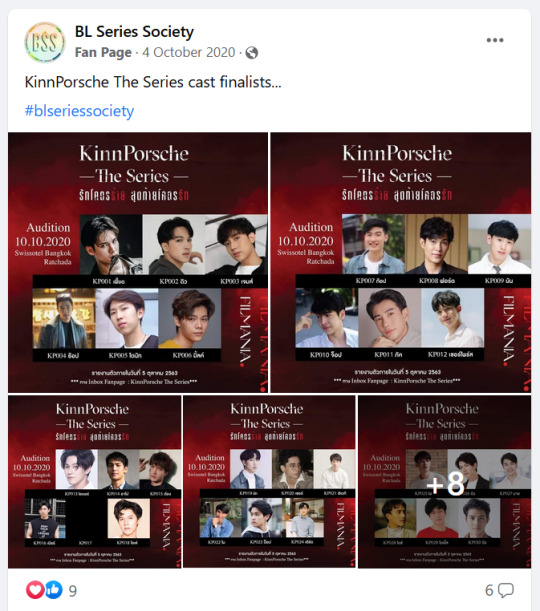
Now, October 10, the "official" audition date is (1) The day Mile and Apo were both fast tracked through auditions and (2) met again. I don't think anyone on the English side of fandom has noticed this or at least publicly talked about this discrepancy so I'm bringing you hot news (that I've been sitting on and not sharing lol)
youtube
It is worth pointing out that this is supposedly the photo below is of their first kiss from the auditions, and they're both wearing different clothes, so. I'm guessing the fast tracking was actually for the first round of auditions between Oct 1-3, and then the kiss was Oct 10.


Anyway, they sat next to each other and Apo talked to Mile first, regardless of if it was the same day (likely not, in my opinion)
There's also a couple of different photos of them together at audition.
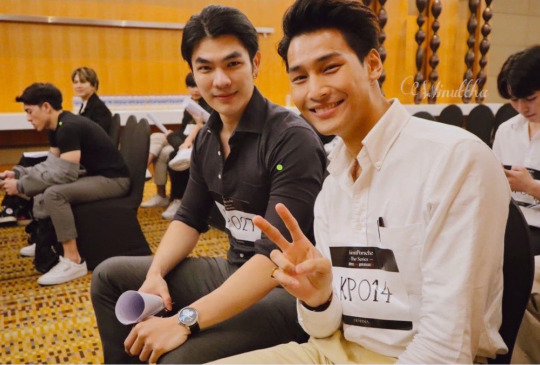
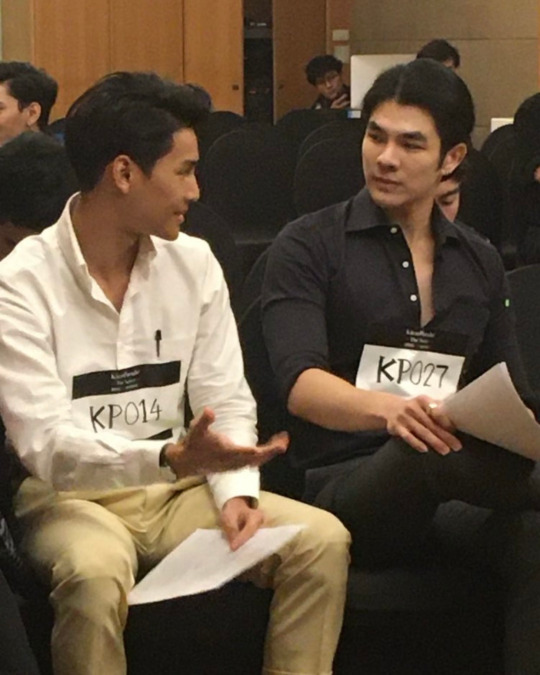
Notably, in the first they're sat in uh, waiting area chairs. There's a different clip of Apo sitting behind Bible, so I'm guessing this is before Apo talked to Mile and he had noticed Mile while sitting in this area and went to talk to him.

The moved together down the line to the audition room, I think?
where Sprite interviewed them:
youtube

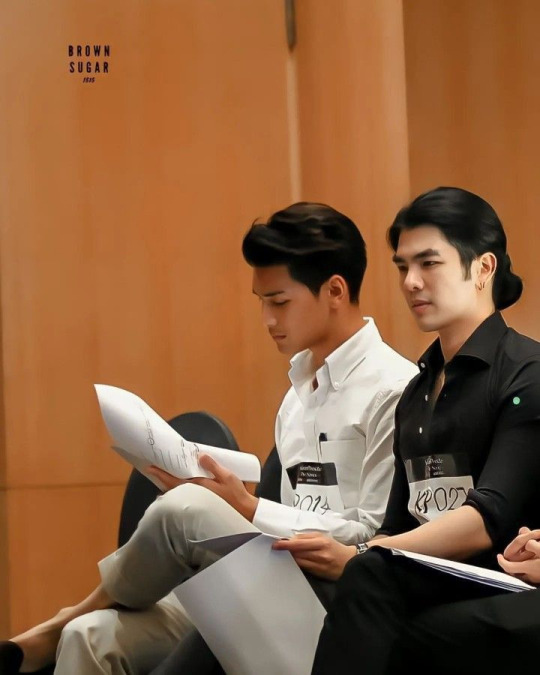
Also based on this last photo they switched sitting order at some point while waiting to audition
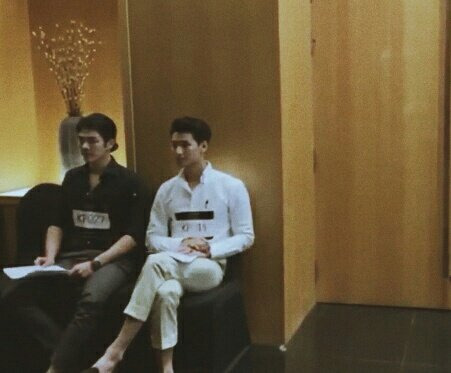
Mile's casting
So aside from the fact Mile visibly went to auditions, there is a rumor with some basis that Mile was pre-cast as Kinn. Probably soft confirmed by Mile himself.
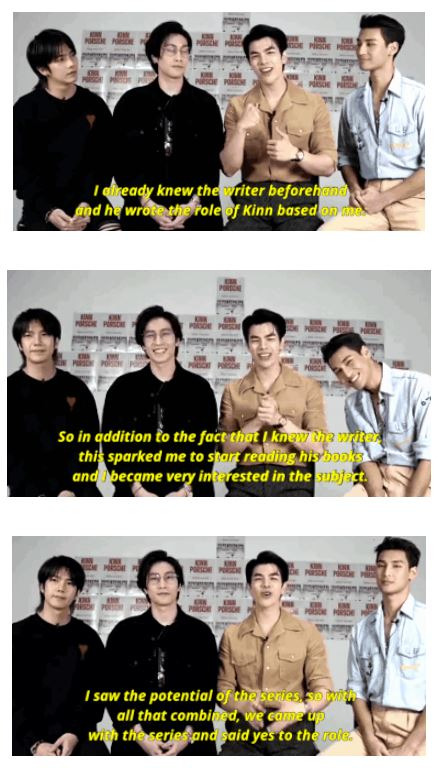
I'm just going to close the loop on this discrepancy too: I think Mile was an invited audition/casting in the same way Ke Huy Quan was invited to audition for for Waymond Wang. Mile did audition. He was likely get the role because he was so preferentially invited by the authors and was the basis for the character.
Clearly, Ke Huy Quan won an Oscar and Mile won a GQ breakout actor award, so in invited casting, even for seemingly "unimportant" roles, it doesn't speak to an actor deserving or not deserving the role based on of acting skills. Mile also was cast as the main character Bohn in My Engineer in 2017 before turning it down; he clearly has some acting chops and can win lead roles.
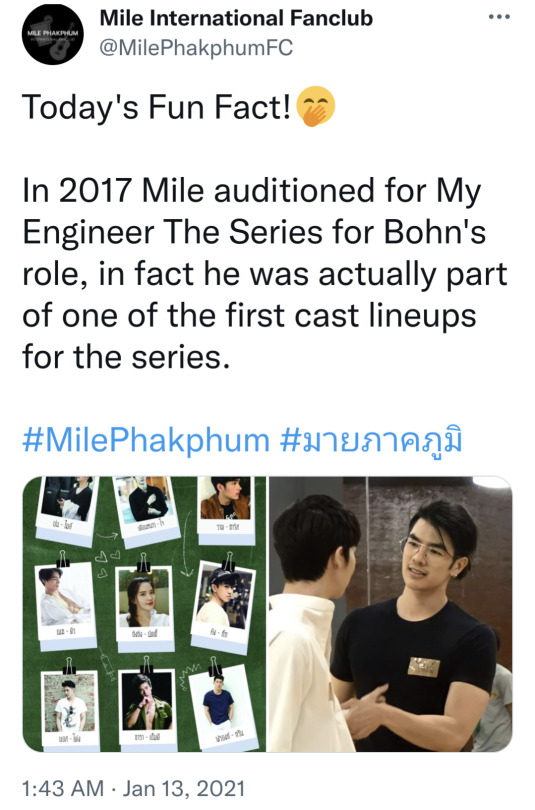

In academia, often times internal postings will open for tenure track positions with a preferred candidate in mind; but due to rules these postings are made public and sometimes an outside candidate will blow the preferred candidate out of the water in terms of quality and get hired instead.
Which is to say there could have been another actor that ended up impressing more in auditions as Kinn even with Mile being preferred, or another actor pair that seemed more suited for Kinn and Porsche.
The other thing auditions do is allow for actors to screen test chemistry. So finally, Mile actually going through the casting process allows him to screen test a for a pairing partner. Which brings us to...
Pre-cast Preferred casting rumor credibility: 10/10
Apo's Casting
Play Mastermind.mp3 by Taylor Swift
Once Twice upon a time, the planets and the fates
And all the stars aligned
You and I ended up in the same room
At the same time
Okay if you didn't catch it on the first watch...
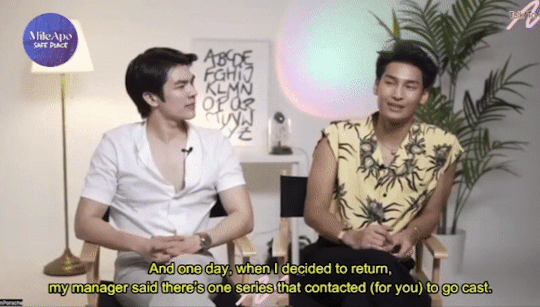
Mile, what the heck is that expression. 😂😂😂
Again, Apo was invited to go to casting specifically for Porsche and only for Porsche. Apo has never acted in a BL before going to audition for KPTS, so the question begged who invited him and why?
First of all, Mile has made it clear that he was a fan of Apo's acting work and followed his career after they met in the gym. He's also made it clear he had the world's biggest crush on Apo. Look how excited he was to talk about working with Apo and how handsome he thinks Apo is in January 2021 (like 3 months after they met again!)

If Mile was the preferential Kinn cast and he didn't have an pairing partner, it would make sense to ask him if there were any actors he thought he might work well with.
I'm not entirely convinced Mile engineered for Apo to get cast or anything. Apo's acting career and skills stand on their own and I think their insane screen chemistry speaks volumes about why they were cast. But as for who made the request to Apo's manager ... hm 😏 Maybe we'll find out one day.
Mile Phakphum - Mastermind.mp3 rumor credibility: 6/10
#mile phakphum#apo nattawin#mileapo#kinnporsche#kpts#kinnporsche lore#kinnporsche bts#kinnporsche meta#filmania#old but gold
475 notes
·
View notes
Note
Hi! I've been debating worshipping Jesus alongside my hellenic deities. I'm just wondering, would it be odd for me to not consider the Bible word of God? I know it has been translated and re-written and I think of the Bible the same way I think of greek myths. Also, any advice on dealing with the idea of sin? I didn't grow up with the idea of sin and for some reason the idea of being born impure keeps messing up my thought process.
Thank you so much! and Happy Easter!
Hi there sunshine! ☀️
I don't know how long this has been in my inbox, so thank you for waiting until I came back from my break during Lent. Happy Easter to you too!
I don't think it's odd at all for someone blending Christian and pagan practices to view the Bible the way you do. I personally view the Bible as the word of man inspired by God, similar to the Greek myths as you mentioned. I have a post talking about that here, if you want to hear my thoughts.
The idea of sin also took me a while to wrestle with as I wasn't raised with it either. I can tell you what I believe and maybe it'll give you some clarity or comfort. Personally, I don't think we are born impure or that our flesh is vile. I believe that we are made in the image of the gods (Jesus and Yahweh included). If the gods crafted us, how are we impure? That never made sense to me.
I do believe however, that in falling away from the gods and not living in accordance with them and with virtue, we can make ourselves impure. I try to follow my gods as closely as possible and live my life in a way that glorifies them. I view things that aren't in accordance with the gods or aren't from them as sins, and I pray to my gods to lead me away from those temptations so that I may be better in their eyes.
The Greeks had similar(ish) concepts called miasma and agos. I have a post here talking about it, if you're interested. To me, learning that the pagans had something like 'sin' made the concept easier to process. But, in my opinion, you don't have to believe that we are born impure to grasp the concept of sin or to worship Jesus. He's a very joyful and patient deity, very much like a teacher or guardian. You'll find your feet with him and if you tumble, he will catch you.
I feel like my answer was a little vague, but those are my general thoughts. These are really important questions and I know I struggled with the same things when I started blending my practices into Christopaganism. Thank you so much for asking, sunshine! Please feel free to reach out again in future!
Khaire! ☀️
#asks#answered asks#christopagan#christopaganism#jesus christ#pagan#paganism#helpol#hellenic pagan#hellenic paganism#polytheism#polytheist#folk catholic#folk catholicism
64 notes
·
View notes
Text
The Verdict- Chapter Two

Pairing: Vincent Renzi x OFC
Warnings: mentions of death, awkward OC, it’s pretty mild at this point. if you’ve seen Anatomy of a Fall, you basically know what’s about to happen.
A/N: if you’re back for chapter two, welcome back. Swann Arlaud at the Oscars actually recoded my DNA. imagine writing 11 whole chapters and then literally going back and completely re-writing them- that’s what I’ve been doing with this story. I won’t be following along word for word with the plot of the movie, nor will I be recounting everything perfectly. I tried that (I’ve watched Anatomy literally 4 times to the point that I actually dreamt in French one night) also huge shoutout to my friend @luxlisbons for her support and a huge shoutout to the dictionary and thesaurus that have basically become my Bible. also if you want to be tagged when I post the upcoming chapters, just let me know.
Vincent glanced across the office space to find Leah seated on the floor, surrounded by a chaotic array of case files. She appeared lost in thought, her brow furrowed in concentration.
"You're quiet," Vincent remarked, making his way over to her.
Leah looked up, a hint of frustration evident in her eyes. "Would be nice if I could speak French. It's taking double the time when I have to translate all this."
Vincent reached out and took the report from her hands, flipping it over to reveal a series of photos on the back. "There are pictures on the back, you know?" he pointed out. "This autopsy report is inconclusive at this point. He supposedly fell from the third floor window."
Leah, feeling a glimmer of hope, asked, "Have you interviewed her yet?"
Vincent nodded. "I went to see her the day before you arrived."
"And?" Leah inquired, hoping for a breakthrough.
Vincent's expression remained somber. "A man is dead," he stated matter-of-factly. "Was that lost in translation?"
Leah shook her head, the weight of the case pressing down on her shoulders. She returned to the pile of files before her, determined to unravel the mystery that lay within.
________________________________________
“Do you eat?” Vincent’s voice rang out, startling Leah from her place on the floor. She chuckled, her concentration finally broken after hours of sifting through each piece of evidence Vincent had presented her with.
“Sometimes I do,” she joked, standing to stretch, her shirt riding up enough for Vincent to see a stripe of her stomach.
“Do you plan on eating today?” Vincent asked, perplexed by how she must be running on fumes considering the time she had spent unmoving.
Leah’s eyebrows shot up in mock surprise. “Probably should,” she sighed. “I’m starving.”
With a grin, Vincent guided her to a cafe across the road and down the street. Over a course of croque monsieur and a few cups of coffee, the two lawyers exchanged glances and subtle smiles.
“You’re quiet again,” Vincent's voice broke through the silence, his eyes studying Leah's thoughtful expression as she gazed out the window.
Leah’s lips curved into a small smile. “Sorry,” she said, her fingers absently tapping on the table.
“Lost in translation again?” he joked, a playful glint in his eyes.
Leah shook her head, her gaze returning to meet his. “No, just lost in general. Jet-lagged,” she admitted with a tired laugh.
“So, you passed the Bar on your first try?” Vincent asked, leaning back in his chair, his curiosity evident.
Leah nodded, a proud glint in her eyes. “I did, yeah,” she replied, a hint of satisfaction in her voice. “How does that work here? What’s the process of becoming a lawyer?”
“Law students sit for the Bar exam at the end of a Master's degree,” Vincent explained, gesturing with his hands to emphasize his point.
Leah nodded thoughtfully, absorbing the information. “So we’re not that different,” she mused, a small smile playing on her lips.
Vincent chuckled softly. “As far as having things in common, you and I have both passed the Bar exam, yes,” he agreed.
Leah shifted in her seat, fidgeting with a napkin. “I’m not good at this,” she gestured between the two of them, “talking about myself.”
Vincent’s laughter filled the air between them. “That’s okay,” he reassured her with a nod.
Suddenly, the cafe grew busier, the hum of conversation surrounding them. Vincent noticed the change and turned his attention back to Leah.
“Where are you staying?” he asked, his tone gentle and curious.
Leah met his gaze, a hint of gratitude in her eyes. “Uh, Saint Germain?” she replied, blushing embarrassingly at her American way of pronouncing the name.
Vincent nodded, his expression unchanging. “Do you want me to walk you home so you can get some sleep?” he offered, his sincerity evident.
Leah's eyes widened in surprise, touched by his kindness. “You don’t mind?” she asked, a softness in her voice.
Vincent shook his head, “I wouldn’t have offered if I didn’t want to,” he said, his eyes meeting hers with warmth and understanding.
________________________________________
Leah glanced at the phone resting on the bed amidst a pile of discarded shirts, her brow furrowed. "It’s awkward," she began, her voice tinged with uncertainty, "I mean, it's not a language barrier issue because he speaks English well. But yesterday at lunch, he was trying to make conversation, and I was completely lost in my own thoughts. The whole interaction felt off, and now I have to endure hours in a car with him to go meet the defendant and her son in the middle of nowhere."
A voice emanated from the phone, cutting through Leah's musings. "Maybe it's just your awkward charm," it teased, provoking a scoff from Leah. "I'm not awkward, Kate. I'm just observant. There's a lot to be learned by listening, you know?"
As Leah slipped into a long-sleeved top and checked her reflection in the mirror behind the bedroom door, she heard Kate's next question. "Is he good looking?" Leah chuckled softly, a hint of a smile playing on her lips. "Yes, he is."
Kate's curiosity didn't stop there. "Do you think she's guilty?" Leah pondered the question, her gaze drifting to the phone in her hand as she mulled over the case details. "I'm not certain," she replied thoughtfully, "but given my track record with men, it's hard to distinguish between genuine intentions and hidden motives."
The abrupt sound of the doorbell pierced through the apartment, causing Leah to startle. "And now he's here to pick me up," she muttered, a mix of anticipation and apprehension swirling in her gut. "I'll fill you in on everything tomorrow," she promised before ending the call.
_________________________________________
The journey from the vibrant heart of Paris to the serene, imposing presence of the French Alps served as a physical and metaphorical transition for Vincent and Leah. As they navigated the winding mountain roads, Leah's gaze was drawn to the changing landscape, her mind a whirlwind of anticipation and uncertainty about the case and her role in it.
Vincent, for his part, found his attention intermittently captured by Leah when he allowed himself to take the seat of the neutral observer—her dark brown hair reflecting the sunlight, her compact, curvy figure a stark contrast to the sprawling, rugged beauty outside the car window. It was an awareness he couldn't quite shake, an acknowledgment of her beauty and the energy she brought into his carefully structured world. Leah, for her part, glanced at Vincent as her eyes roamed across the changing scenery around them, letting them dart across his side profile, the slope of his nose, the lines etched around his distinctive eyes.
The time they had spent together had been consumed by meticulous details regarding the case and its sordid details, not allowing any time for pleasantries outside of what Leah’s resume held, and what little information she was able to gather about Vincent from a rigorous google search. Besides the conversation the day prior in the cafe, they were still relatively strangers to one another.
Arriving at Sandra's secluded home, they were greeted by a scene of tranquil isolation, the peace of the valley juxtaposed with the storm brewing within its inhabitants. Sandra, with her guarded demeanor and measured greetings, presented a figure of resilience, her German accent marking her words with precision as she navigated the conversation in her adopted language.
Leah's interaction with Daniel, Sandra's son, and the family dog, Snoop, was most shocking to Vincent. Leah's gentle, unassuming approach won Daniel over, her laughter and warmth cutting through the reserve that had initially greeted them. Vincent observed these interactions with a growing appreciation for Leah's natural empathy and the ease with which she connected with Sandra and Daniel, despite the shadows that hung over the household.
The discussion of the case took on a new dimension as Leah's presence seemed to soften the edges of the tense atmosphere. Her insights into the case brought fresh perspectives that even Vincent had to acknowledge were invaluable. Yet, it wasn't just her professional contributions that caught his attention; it was the way the alpine light danced in her hazel eyes, the genuine concern etched on her porcelain skin, and the graceful way she moved through space.
As the day wore on, Vincent found himself increasingly aware of Leah—not just as a colleague but as a woman who intrigued him.
The visit to Sandra's home, intended to deepen their understanding of the case, ended up opening up a dialogue into one another’s thought processes. The sum of which came to fruition as the moonlight illuminated sharply against the car’s hood.
Vincent's voice cut through the silence inside the car, breaking the rhythm of the road beneath them. "Who are you exactly?" he inquired, stealing a quick glance in her direction before refocusing on the winding path ahead. A puzzled expression settled upon her face as she met his gaze, her features momentarily frozen in confusion.
A soft, genuine laugh bubbled from her lips. "What?" she responded, the musical lilt of her voice betraying her confusion at his question.
"They were hanging on your every word back there," Vincent remarked, a hint of amusement in his tone. "Sandra's a tough nut to crack, but you seemed to have opened her up a little."
"I could barely get a word out of you yesterday," Vincent added with a chuckle, his eyes back on the road.
"Sandra," Leah began, her voice taking on a more serious tone as she turned to face him, "How do you know her?"
Vincent's reply was brief, a pause punctuating his words. "Old friends. Ancient history."
A thoughtful expression crossed Leah’s face as she considered his response. "You know what they say about history?" she mused, her gaze steady as Vincent fell silent.
Vincent's brows furrowed slightly. "What do you know about ancient history?" he countered, a smirk playing on his lips.
"That it has a way of repeating itself," Leah responded cryptically, her words hanging in the air like a lingering mystery.
Vincent's laughter filled the car, mingling with the hum of the engine. "For someone who's usually so quiet, you seem to have a lot of insight into things you claim not to know," he observed, his eyes glinting with a newfound curiosity.
As doubt crept into Leah’s mind, she pondered the implications of her words and the connection between ancient history and the present moment. Little did she know that the echoes of the past were about to resurface in ways she could never have foreseen.
#vincent renzi fanfiction#vincent renzi x original female character#anatomy of a fall vincent#vincent renzi#vincent renzi fic#hot lawyer save me#the verdict#swann arlaud
79 notes
·
View notes
Text
Just got done watching episode 6 of 4 Minutes. At this point I'm almost certain they do the weird music over Bible's NC scenes because they might be too horny otherwise.
Anyways, I've been thinking about the curse the woman Great hit with her car bought. Initially, I thought she was paying for an assassin using selling spells and charms as a front or means of embezzling the money. But if that shit actually worked, and it's what's allowing Great to fiddle with the timelines, then we have to wonder who she's trying to separate from her loved ones with this.
All signs point to this being Great's father. I keep getting stuck on the lyrics they mentioned in an interview, with one of them being something along the lines of giving up everything to be with someone.
In the timeline Great's creating, his mother has (presumably) died. Great's a smitten 21 year old, still kind of a kid, being spoon fed a do-over with the Barbie Dream Doctor Boyfriend Edition that is Tyme, and his father is a homophobic footnote in his subconscious.
Korn has been given a romantic ultimatum by Fasai that's not likely to end well. Korn was able to tolerate her because he had Tonkla to go to to reclaim a sense of agency and control with. All the characters around Great's father are either being killed, in the process of dying, or in the process of events that could see them choosing their own paths over one provided by his dirty money.
The woman also specifically told Great that he would have a bright future, and this is one of those situations where I wish I understood Thai because I feel like there's some stuff that was likely baked into her wording that got lost in translation.
This episode also once again proved Sammon is the real queen on the scene in the BL writing community. I was so convinced the Great we were seeing in the new timeline was reflective of the one in the old timeline. But no, Great was a coward, a spoiled brat, completely removed from a world of consequences, an accomplice to murder, and so fraught with Daddy issues the idea of getting caught on 4K letting time hit it like a 747 filled him with childish glee. And Tyme was into that. These two definitely deserve each other, and would definitely have me considering an OnlyFans subscription. The Great we were seeing in the new timeline was a Great reacting to his subconscious trauma of all his actions catching up to him.
In summation, I have no idea what's going on, but I deeply hope that getting shot does not deter either of them from starting an OnlyFans if Tyme's career as a surgeon doesn't work out. Also, I still have no solid theories as to who Tonkla is killing that field. My theories are Title, Korn, or Win. Yeah, that's right, I finally remembered Win's name and am not calling him lanky cop anymore. I am capable of positive change on occasion. If some of you little 20 year old shits had been smoking weed since the tail end of the Clinton administration you'd have memory problems too.
#4 Minutes#4 minutes the series#GreatTyme#KornTonkla#WinTonkla#BOC#Be On Cloud#4 minutes spoilers#4 minutes episode 6
28 notes
·
View notes
Text
Things about being a Christian I've had to unlearn as an adult:
Spending a lot of time on/ being invested in something doesn't make it an idol. This is not how that works, bestie. Look. I get that the advice "if you spend more time on x hobby than you do reading the Bible and praying" is well-intentioned, but it's just plain Bad. There are a lot of hobbies that take significant amounts of time. Art. Writing. Trade hobbies, like woodworking. I spent two hours Saturday putting in a garden (now that I have space for one!), and not spending two hours and one minute on Bible reading doesn't mean that gardening is now an idol for me. It means I got into a groove and just kept going (and got terribly sunburned for my trouble). What makes something an idol is NOT how much time you spend on it but rather the importance you place upon it. Sometimes important things take five minutes and sometimes they take an hour; the thing that took five minutes isn't less important because it took up less of your time. If your thought process is "this is more important than spending time with God", that is what makes your hobby an idol. (If you are constantly foregoing your time with God in favor of a hobby, then I'd say you need to re-evaluate your priorities, but spending a lot of time on something does not inherently make it an idol. Not to mention that a lot of hobbies can still bring you closer to God despite not spending that time intentionally for that purpose.)
Not having your "quiet time"/ devotions every day does not make you a "bad" Christian. This goes hand-in-hand with the previous point, and there's a lot I could say on this topic, but what it boils down to is this: God understands our human limits and the brains He gave us that sometimes make it difficult -- autism and ADHD and OCD and [fill in the blank]. I'm autistic. So when (well-meaning) people say things like, "you can't get to know God if you don't spend time with Him!" about praying and reading the Bible -- well, 'spending time' looks different for me. Socializing is difficult for me. And while socializing with God is obviously different than with people, praying is still far more mentally draining for me than for most people (especially growing up in an environment where it was implied that you have to 'say the right things' when you pray instead of just allowing it to be a conversation, but that's the next point). A lot of "socializing" for me is simply being present with someone else. This is called "parallel play": you're doing your own thing in the same space as someone else while they are also doing their own thing. This...doesn't translate well to Christianity and what Christianity is "supposed" to look like, unfortunately, so I constantly felt shame that none of the common advice worked for me when it seemed to work for everyone else. Set a time? Executive dysfunction makes switching tasks hard and once that set time has passed, "well, it's too late now". Having a reading plan? I'd miss a day, fall behind, and the shame at that would keep me from continuing to try. And when I did manage to stay on track, quite often it simply became a box to check off and that was it. So, now, I do what I can, when I can. I always get more out of it, and I think God cares more about that than sticking to a plan just so you can say you read every day anyway.
"Don't script your prayers! They'll become repetitive and you won't think about or mean them!" Oh, boy. Once again, I get the well-intentioned meaning here. You don't want your prayers to become rote and stale. But as someone with high anxiety, scripting them is the only way I can survive praying aloud with other people, and, in fact, it means I put more thought into them, not less! But hearing this kind of advice coupled with an environment where it was implied you had to say 'the right things, the right way' was absolutely detrimental to my prayer life growing up. I was always worried about saying the wrong thing, especially as an undiagnosed autistic who was constantly, ya know, saying the wrong things in conversations with people. So I definitely didn't want to say the wrong things to God! But... I also wasn't allowed to plan what to say? How was I supposed to pray then? So I just. didn't pray. For a very long time. Until I learned its just as perfectly okay to talk to God about whatever crosses your mind while you're standing at the sink doing dishes as it is sitting down with a list of things to focus on. (Not to mention that this really is just...terrible advice in general. Kudos to my pastor, who, in his current Sunday night series on worship, actually gave a tutorial on how to personalize praying the Psalms. So, you know, pre-written prayers.)
Purity Culture. Need I say more? Oh, I could write a whole post about how harmful this is, but plenty of people already have, so I'll leave it at this: I wear what I am comfortable wearing now. Something I love about my church is that our philosophy on modesty is this: The greatest sin of immodesty is saying "look at me" instead of "look at God." In other words, modest isn't about what you're wearing so much as what your attitude about what you're wearing is. If you choose what to wear because you want people to notice and stare and give you compliments, then that is immodest no matter how much of your skin is covered up. It's not immodest to wear clothes you like and that you think are attractive (or that help you look professional when its called for), but ultimately your mindset is really not about "dressing to impress." (There is a very thin line between 'modest' and 'immodest' and its not where most people think it is.)
#christianity#autistic christian#autism#autistic#(adding those tags because some of these things really are autism-specific or at least related)#i'm sure there are more than these but these are the ones i've been thinking about recently for whatever reason#feel free to add on your own things if you like#long post
38 notes
·
View notes
Text
Radio Omens time!! Strap in for my subjective personal opinions made by one person about the full-cast radio adaptation of Good Omens.
We're gonna begin with: I am blowing kisses to the scripting/editing/production team. This thing is an impeccable adaptation. Im-pecc-a-ble. The voice talent is fantastic, the energy is stellar, the pacing is excellent, and the sheer amount of atmospheric info they managed to translate into radio-friendly format? Mwah mwah mwah. I think it's the kind of listening format that's not for everyone, but it is SO for me.
Time for some specific highlights! It was a long day so we're a little extra silly this time. It's also long and not in a reasonable order.
(Ok good my page cut is working this time.)
- Good GOD I forgot the primary voices were Like That. I shrieked (happily) as soon as Aziraphale's mouth opened. This is why I travel alone /hj
-- (Incidentally, I said "oh fuck holy shit I can't do this" when Crowley started talking, but I did it anyway *sighs in bisexual*)
- Hheeeennghsh the opening scene in Eden is. The way it's written successfully sets up who Aziraphale and Crowley are, who they're supposed to be to each other, and a hint at who they're going to be to each other later because they are SO delightfully snippy at one another in this scene. Aziraphale's "oh, it's you" and Crowley's "mmhm, yeah, well done on keeping demons away. Bravo" (heavily paraphrased) will be living rent-free in my head until I have time to write a fic about it.
- So, having Aziraphale do the early narration is an excellent way of setting the tone. What I need you to do, if you've only done tv omens (which is so so valid and I think really is another excellent adaptation), is remember Aziraphale's magician persona. And then imagine him being that for the entire story. The pitch, the rate of speech, the slightly frantic energy, the drama: it's all just part of his overarching character in radio omens, and it's SO good for storytelling.
- Radio Crowley knows what's in all of Aziraphale's infamous Bibles so well that he can quote them. I love this detail, I love it as a means of establishing their relationship during their "let's be godfathers" scene, and I love how hard he's ribbing poor Aziraphale about the extra verses in Genesis.
- Radio Crowley is SO like... tender? I mean, all Crowleys are to some extent Soft but something about this one has just a little extra something. I love the way he talks about his temptations and shenanigans. He's so proud. It eases what could feel like needless exposition because he really seems to like explaining his process.
- That's a bit of the same of what I mean about Aziraphale's personality. Since he's very obviously inclined to dramatize a story, exposition just fades neatly into his character rather than grating on the nerves.
- They reference The Arrangement a lot and usually with a great deal of affection. There's one particular time when they even acknowledge something about wanting to protect each other.
- I adore the way Anathema and her ties to Agnes are introduced. It's so concise but meaningful, and it's just the right amount of setup for her character appearing later.
- The baby swap scene in other iterations relies so much on descriptive narrative or visual language, but you know what? The heavily trimmed down version also works surprisingly well.
- Crowley knows about the hellhound way beforehand (and, of course, he tells Aziraphale. They plan their roles for the party years in advance, which is an extremely efficient way of communicating about that scene to the listener).
- At Warlock's party in the book, Crowley gets all suspicious about a gerbil being gifted to him. In the radio drama, Aziraphale wonders aloud if the gerbil might be suspicious and Crowley tells him not to be stupid. Just struck me as a funny thing to shuffle around.
- Adult radio Anathema is everything to me actually.
- Poor Newt's childhood gets skipped over (unless I missed it, which is possible), but I liked his adult introduction as well; it brings in the whole Witchfinder-adjacent cast at once and makes it super clear how they all know each other without lingering.
- Shadwell. Just. The actor's voicework is so evocative of someone who is very gesturally expressive. There's no way he wasn't swinging his hands around in the recording space.
- The Them are all 100% perfect. Shout-out to Adam for that mind-rending scream that I was not expecting to go on for so long. Interestingly, in chapter credits, the Them are not grouped with the humans! This makes sense, but it also made my brain go !!!
- The horsepeople (both original and extra) were also so good, and that chunk of the cast gave the impression of good chemistry, so the scenes were really fun.
- Crowley says Aziraphale's name a lot. A lot a lot. Actually, most people do; probably for simplicity's sake, there's no "Mr. Fell," or "Nanny Ashtoreth," just "Mr. Aziraphale" and "Mr. Crowley."
- Well, Shadwell does say "Mr. A," and there is a Brother Francis.
- One of Nanny's rules for Warlock is "don't talk to the creepy gardener" rkahjdjs Crowley what is wrong with you
- I did in fact let out another sound when the Nanny voice happened. We're not talking about it.
- When applying for the jobs, Aziraphale just straight up calls dibs on gardener and Crowley complains and says something like "can you see me in a skirt?" and Aziraphale just pulls a date at random on which he'd seen Crowley in a skirt. This was probably also in the book, but I noticed it here and didn't there.
- Crowley's idea of something calming to listen to was a radio gardening talk show ;~; and he likes listening to televangelists for the lulz (I have never used that phrase before in my life but I'm keeping it)
- Having him hear Aziraphale possessing the televangelist was absolute genius for keeping the plot cohesive.
- Seance scene continues to be painful ahahaha...
- Hell's emissaries know that Aziraphale was discorporated and they're mean to Crowley about it in a way that implies Hell has long been aware that they're working together. Intriguing...
- There's mention at some point about how no homes in Tadfield have PlayStations or Xboxes, and I think that's a cool bit of writing to establish the time period (along with Newt bricking smartphones, which I think was said at least in breadcrumbs).
- Almost forgot, but Mr. Gaiman and Sir Terry Pratchett being the policemen trying to book Crowley for speeding in the beginning is so cute.
- When Satan is about to show up, Aziraphale worrying about everyone else and Crowley going "and me!" like hello, I am also in danger, that's my boss?? if u even care?? was SO funny in this version to me.
- Look, there were a lot more things, but it's already been several hours since it ended, so I'm sure I'm forgetting many.
- Oh! Pepper's backstory being transformed into her speech to Adam was SO good on so many levels. It really drove home that Adam does love his friends, it deepened their lore gradually, it made Adam's role and decisions very clear, and it also struck me as "Pepper says trans rights" even if that wasn't the intention, so hell yeah.
- The gag reel leads me to believe that Peter Serafinowicz is A) probably the funniest person alive to work with and B) extremely relatable due to the amount of time spent on the struggle bus. Also whoever put the breaking glass sound over all the accidental swears, I love you forever.
#good omens#radio omens#reading notes#cactus chatter#maybe i just need a new tag like “dran being unreasonably feral about good omens for way too many words”#suggestive#maybe?
132 notes
·
View notes
Text
every time i see people say that all translation operates at a loss it so completely baffles me. all translation operates at a gain, because you are adding things to the source text: a new retelling and interpretation by the translator; a new audience of new readers, from a new cultural context; a new relationship between cultures (source and target); a new network of inter-connectivity and reference (a translation can link a work external to the culture into its own culture's network of literary references in ways a source text simply cannot - thinking here about the ways the LXX links the jewish bible to hellenistic epic traditions using word choice and other allusions! that's not present in the hebrew bible, but is possible in the greek translation - even without changing the plot or content).
a translation is always generating more new meanings than reading a work in its original language would! works and words that are "untranslatable" exist but we generate such tremendous meaning by TRANSLATING THEM ANYWAY. it's only a "loss" if you think of everything as a zero-sum game where objectivity and the meanings of words are bounded by the limits set down by other people in a dictionary. meanings change! the dictionary describes how a word IS used when the dictionary is written, not how its meaning has changed over time and not how it might come to change in the future.
language, culture, and texts are all part of a continuous process of recreation: you, as a reader, bring something completely unique to every text you ever read. translation does the same thing: it changes not just the source text into a target language translation, but it also changes the target language and the target culture by shaping those around concepts that might not naturally "fit". and those changed meanings then trickle backwards into the source language. everything is always changing! translation is an incredible opportunity to watch these things change in real time.
obligatory caveat: i'm not going to pretend that language and cultural imperialism aren't worrying dynamics that can exist in translation; obviously they can be. but that's not the fault of the *process of translation*, that's the fault of cultural imperialism and exploitation. the idea that cultures should be firmly discrete and isolated from each other and never interact is frankly worrying! it's possible to interact across cultures - and to translate! - without linguistic supremacy burrowing its way in, especially if you decouple the translation process from christian ideologies (the letter doesn't matter, just the spirit) and capitalist priorities (what will sell for easy consumption) about what makes a "good" translation.
#TRANSLATION RULES and the way people seem to be talking about translation on this site has for real started to freak me out#do you not want to be in relationship with and open to other cultures and stories??#do you only want stories that fit neatly into your understanding of the world? you don't want anything that's challenging or complex --#-- or 'untranslatable' and translated anyway?
206 notes
·
View notes
Text
Lucifer & Luciferianism
Lucifer, a figure traditionally associated with rebellion, light-bringing, and the pursuit of knowledge, holds a significant place in the belief system known as Luciferianism. Unlike the portrayal of Lucifer in mainstream Christian theology, where he is often depicted as a fallen angel and embodiment of evil, Luciferianism views Lucifer in a more complex and nuanced light. This essay will explore the origins of Lucifer as a symbol, the key tenets of Luciferianism, and the role Lucifer plays within this philosophy, emphasizing the themes of enlightenment, personal empowerment, and the rejection of dogmatic authority.

Origins and Symbolism of Lucifer
The name "Lucifer" originates from the Latin term "lux" (meaning light) and "ferre" (meaning to bring), translating to "light-bringer" or "morning star." In ancient Roman mythology, Lucifer was a name given to the planet Venus when it appeared in the morning sky, symbolizing the bringer of light before dawn. This concept of Lucifer as a light-bringer later became intertwined with Christian theology, where Lucifer was reinterpreted as a rebellious angel cast out of Heaven for challenging God’s authority.
Lucifer in Christian Theology:
In the Bible, particularly in the book of Isaiah (14:12-15), Lucifer is depicted as a fallen angel who sought to ascend to the heavens and become equal to God. This act of rebellion resulted in his expulsion from Heaven and his subsequent association with Satan, the adversary. Over time, Lucifer became synonymous with the devil, symbolizing pride, defiance, and the embodiment of evil.
Reclamation of Lucifer in Esoteric Traditions:
However, in various esoteric and Gnostic traditions, Lucifer is reclaimed as a symbol of enlightenment and the quest for knowledge. In these interpretations, Lucifer represents the pursuit of truth, the challenge of oppressive systems, and the light of wisdom that guides humanity. This reinterpretation is foundational to Luciferianism, where Lucifer is seen not as an evil being, but as a symbol of individual empowerment and the search for enlightenment.
Key Tenets of Luciferianism
Luciferianism is a philosophical and spiritual belief system that venerates the qualities associated with Lucifer, such as enlightenment, personal freedom, and the pursuit of knowledge. It is not a religion in the traditional sense but rather a path that encourages individuals to seek their own truth and cultivate their inner strength.
Enlightenment and Knowledge:
At the core of Luciferianism is the pursuit of enlightenment and knowledge. Followers of this path view Lucifer as a symbol of the light of reason and intellect, guiding them towards self-discovery and understanding. This pursuit of knowledge often involves questioning established norms, challenging dogmatic beliefs, and exploring the deeper mysteries of existence.
Personal Empowerment and Self-Actualization:
Luciferianism emphasizes the importance of personal empowerment and self-actualization. It encourages individuals to take control of their own destinies, make informed choices, and cultivate their own inner power. This process of self-empowerment is seen as a form of spiritual evolution, where individuals transcend limitations and realize their full potential.
Rejection of Dogma and Authority:
A key aspect of Luciferianism is the rejection of dogmatic authority, particularly that which suppresses individual thought and freedom. Luciferians often challenge religious, social, and political structures that they perceive as oppressive or limiting. This rebellious spirit is inspired by the myth of Lucifer's defiance against the ultimate authority, symbolizing the struggle for autonomy and the rejection of blind obedience.
Ethical Individualism:
While Luciferianism values individualism, it also advocates for ethical conduct and personal responsibility. Luciferians believe in acting in accordance with their own moral compass, rather than adhering to external codes of behavior imposed by society or religion. This ethical individualism is based on the principles of self-respect, respect for others, and the pursuit of what is just and true.
Spiritual Transformation and Alchemy:
Many Luciferians view their path as one of spiritual transformation, akin to the alchemical process of turning base metals into gold. This transformation involves the refinement of the self through the integration of knowledge, the overcoming of personal weaknesses, and the development of wisdom. Lucifer, as a symbol of the light that guides this process, represents the alchemist’s fire that purifies and transforms.
Lucifer as a Symbol in Luciferianism
Lucifer in Luciferianism is not worshipped as a deity but is revered as a symbolic figure representing the ideals of the belief system. The qualities associated with Lucifer—rebellion, enlightenment, and personal sovereignty—are central to the Luciferian path.
Lucifer as the Light-Bringer:
In Luciferianism, Lucifer’s role as the light-bringer is paramount. This light is understood metaphorically as the light of knowledge, reason, and truth. Luciferians seek to bring this light into their own lives by striving for intellectual and spiritual enlightenment. This contrasts sharply with the traditional Christian view of Lucifer as the bringer of darkness and deceit.
Lucifer as the Rebellious Spirit:
Lucifer’s rebellion against God is reinterpreted in Luciferianism as a noble act of defiance against tyranny and oppression. Luciferians see this rebellion as a metaphor for the human spirit’s quest for freedom and autonomy. Rather than viewing Lucifer’s fall as a tragic event, they see it as a necessary step towards the assertion of personal will and the rejection of unjust authority.
Lucifer as the Promethean Figure:
Similar to the Greek myth of Prometheus, who stole fire from the gods to give to humanity, Lucifer is seen as a Promethean figure who brings the fire of knowledge to mankind. This fire represents the spark of consciousness and the capacity for self-reflection, creativity, and innovation. Luciferians honor this aspect of Lucifer by valuing intellectual curiosity and the pursuit of forbidden or hidden knowledge.
The Role of Ritual and Practice in Luciferianism
While Luciferianism is largely a philosophical path, some practitioners incorporate ritual and ceremonial practices to align themselves with the energies and symbolism of Lucifer. These practices vary widely depending on the individual or group but often focus on themes of self-empowerment, transformation, and the invocation of inner strength.
Meditation and Self-Reflection:
Meditation is a common practice among Luciferians, used to cultivate inner peace, clarity, and self-awareness. Through meditation, individuals can connect with the symbolic energy of Lucifer, seeking guidance and insight on their personal path of enlightenment.
Rituals of Empowerment:
Rituals in Luciferianism may involve symbolic acts of empowerment, such as the lighting of candles (representing Lucifer’s light), the recitation of affirmations, or the performance of ceremonies designed to invoke personal strength and determination. These rituals are not about worship but about embodying the qualities that Lucifer represents.
Symbolic Alchemy:
Some Luciferians engage in symbolic alchemical practices, using metaphors of transformation and purification to work on their own personal development. This might involve ritualistic acts that represent the shedding of old, limiting beliefs and the embrace of new, empowering ones.
Conclusion
Lucifer’s significance in Luciferianism is profound and multifaceted, representing the pursuit of enlightenment, personal empowerment, and the defiance of oppressive authority. Far from being a figure of evil, Lucifer is revered as a symbol of the light-bringer, the rebel, and the seeker of truth. Luciferianism, as a belief system, encourages individuals to embrace their inner power, challenge dogma, and strive for self-actualization. By redefining Lucifer in a positive light, Luciferians find inspiration in the mythological figure to guide their spiritual and philosophical journey, emphasizing the importance of knowledge, autonomy, and ethical individualism.

15 notes
·
View notes
Note
osc confessions lore i've gathered as someone who didn't see the stream
there's christianity or something because the biible exists. mephone is jesus (?) and springy is lucifer.
wallace is in massive debt and works at starbucks or some other minimum wage job. they wrote the bible (confirmed canon) and someone made them translate it or something.
pill gates is someone.
steve cobs exists outside the biible(?). that or he's god.
confessionysonas aren't confirmed canon. anonsonas are though?? i think.
wallace is in a platonic marriage with someone uhhh i think.
next thing you know i'm gonna be canon to the lore as a minimum wage employee who's also a conspiracy theorist this is crazy /pos
ok so you got some stuff right
we call it phonism
springy and pill gate(s) are the devil. both of them
cobs is god
confessionysonas are canon i just barely talked about them on stream
wallace is married to tumblr user trans-ankle-biter
you are now canon to the oscc lore as a minimum wage employee and conspiracy theorist
here's some more lore:
she/he mephone4s
heaven is mecloud and hell is... well, hell is "ii breeds"
"when mephone rose the twin towers fell"
confessiony is only fed when the anons feed them
karkat is there
im definitely forgetting some things sorry the stream was 7 hours long and i was going "yes, and" to everything
fics we read on stream: the biible and the biible ii
here's the stream vod too, i'm in the process of adding chapters to the desc so you can skip around -🫒
23 notes
·
View notes